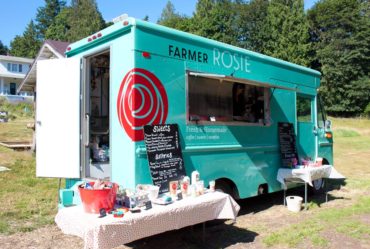 Welcome to Farmer Rosie’s, a come-as-you-are kind of place. Meet an old friend for breakfast or make a new one. Arrive on foot, by bicycle or on horseback, or drive on up.
Welcome to Farmer Rosie’s, a come-as-you-are kind of place. Meet an old friend for breakfast or make a new one. Arrive on foot, by bicycle or on horseback, or drive on up.
Relax in the sun, indulge in that second lavender shortbread cookie or piece of strawberry shortcake, and contemplate the many proven benefits of a slower pace and simpler life.
At the center of this bucolic scene is Cynthia Mora, who operates as Farmer Rosie out of a food truck in Southworth on a farm that’s been in her family for a hundred years. So pull up a chair; every table has a view.
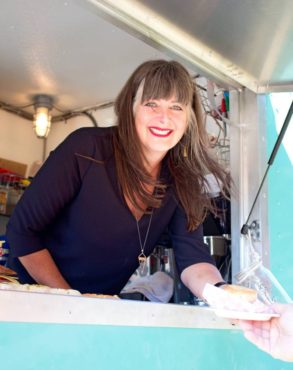
Sit facing the food truck, and that view encompasses the original farmhouse where Mora lives with her husband, Tony, who commutes by foot and ferry to his IT job in downtown Seattle during the week. To the right are the pastures where Paquito, the llama, and Bridger and Bendrix, the sheep he watches over, graze companionably.
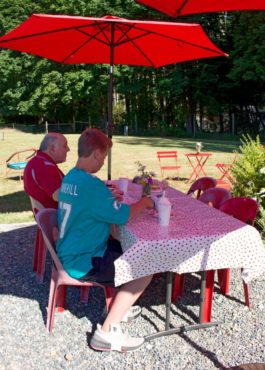 To the left of the house are the large red barn, circa 1920s, and the gently sloping old-growth orchard including apple, pear, cherry and plum trees. Between the food truck and the house are the approximately 200 bushes that provide the blueberries that appear in everything from salads to jam to Mora’s well-loved blueberry galette.
To the left of the house are the large red barn, circa 1920s, and the gently sloping old-growth orchard including apple, pear, cherry and plum trees. Between the food truck and the house are the approximately 200 bushes that provide the blueberries that appear in everything from salads to jam to Mora’s well-loved blueberry galette.
Sit facing north instead, and that view takes in the long driveway up to the house, past the hazelnut tree orchard and the vegetable and herb garden that supply Mora with many of the seasonal ingredients she turns into menu offerings, which vary week to week.
It’s easy to believe that somehow this was all part of a grand plan and that everyone would, if they could, choose to operate a food truck on a hundred-year-old farm. But the path Mora traveled to her present destination was far more circuitous than the two-lane dirt road leading directly from the turn off Rodstol Lane to Farmer Rosie’s hospitality.
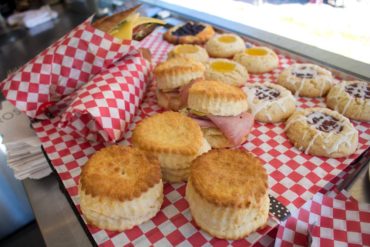 First, there is Mora’s own life. Born in Port Orchard, she grew up mostly in Kitsap and King counties, and many of her early food memories stem from being raised by a single mother and include peanut butter, mustard and pickle sandwiches, and Tuna Helper, punctuated by meals at her grandmother’s, who was raised in the house Mora now lives in.
First, there is Mora’s own life. Born in Port Orchard, she grew up mostly in Kitsap and King counties, and many of her early food memories stem from being raised by a single mother and include peanut butter, mustard and pickle sandwiches, and Tuna Helper, punctuated by meals at her grandmother’s, who was raised in the house Mora now lives in.
She still remembers the first time she ate a fresh blueberry. “I tasted one and thought, ‘This is heavenly. This is real food,'” she says.
She and her husband recently celebrated their 38th anniversary. They met while in junior high school in South Seattle, but didn’t date until after she graduated. “He never had girlfriends,” Mora says. “He only played basketball.”
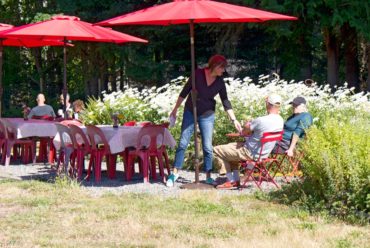 Following his own graduation from high school, he joined the military and was sent to Friedberg, Germany. When Mora joined him for six months, she had some idle time on her hands. A friend sent her a care package that included copies of both “The Joy of Cooking” and “Cooking for Two,” and Mora began her culinary education in earnest.
Following his own graduation from high school, he joined the military and was sent to Friedberg, Germany. When Mora joined him for six months, she had some idle time on her hands. A friend sent her a care package that included copies of both “The Joy of Cooking” and “Cooking for Two,” and Mora began her culinary education in earnest.
“I went through both books like a novel and started cooking,” she says. “Tony ate a lot of Spanish rice from the ‘Joy of Cooking.’ To this day, he won’t eat any more.”
Following their time in Germany, the couple lived in Tennessee and northern California. It was the early 1980s, and Tony was offered an opportunity to train in the emerging field of computers. Eventually, the Moras were sent to Vicenza, Italy, for a year and a half.
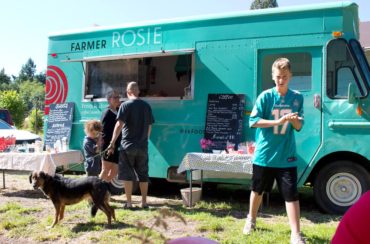 “It was dreamy and magical,” Mora says of their time in Italy. “But I went over six months pregnant and came home with two children after three years.”
“It was dreamy and magical,” Mora says of their time in Italy. “But I went over six months pregnant and came home with two children after three years.”
It was during her time in Italy that Mora took another leap in her culinary education when she was connected to Cadence International, a missionary organization serving the military, and a family sent to serve the base in Vicenza.
“The Harrisons were the house family,” Mora says, “and Linda just took all of us, young women, under her wing. She taught us how to cook, and she taught us how to be young moms, how to share the load with one another. It was really great to have that support, because otherwise, we had nobody. I would have been alone… The only calls I made home were when Anya was born and André was born. It’s not like we had cell phones to carry around. We had to go down and stick our coins into the local phone center in Vicenza.”
Every Sunday, the soldiers and their families would gather for a meal together, and everyone was expected to contribute. “Linda would never know how many soldiers and their families would show up for dinner. It could be 10. It could be 35. So she was always learning how to make it stretch, how to make sure everyone was taken care of. She taught me a lot about hospitality,” Mora says.
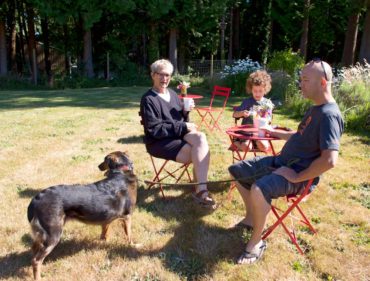 Following Italy, the couple lived in Portland, Oregon, while Tony went to school. When he was offered a full-time position in the reserves, he went back into the military and back east for warrant officer training, specializing in IT work. From there, the couple lived for a time in Indianapolis, where they had an open-door policy and lots of potlucks and parties, according to Mora — and then on to Vancouver, Washington; and Sausalito, California.
Following Italy, the couple lived in Portland, Oregon, while Tony went to school. When he was offered a full-time position in the reserves, he went back into the military and back east for warrant officer training, specializing in IT work. From there, the couple lived for a time in Indianapolis, where they had an open-door policy and lots of potlucks and parties, according to Mora — and then on to Vancouver, Washington; and Sausalito, California.
When they were ready to return to the Pacific Northwest, the couple set their sights on the Portland-Vancouver area, but Mora’s father was diagnosed with cancer, and the family (which by now also included daughter Alessandra) moved to Port Orchard so they could spend time with him.
The farm was in the hands of three of Mora’s uncles, all lifelong bachelors. When the last of them died, 11 cousins inherited pieces of it. “And so all but two cousins sold us their portions,” Mora says. “They wanted Tony and I to live here and take care of it and make it flourish and come back to life.”
They had their work cut out for them: 5 mostly undeveloped acres, with two lilac trees being “the only flowering plants,” according to Mora. The rest was pasture land crisscrossed by old, barbed-wire fences. They decided on blueberries and hazelnut trees as a way to generate income “because we thought it would be the least labor, and we didn’t know anything,” she says.
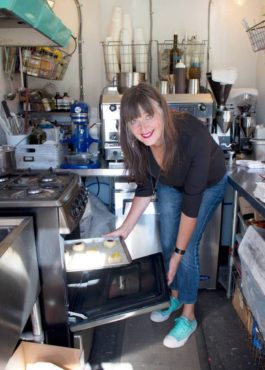 The years passed; the couple’s three children grew up and moved away and had children of their own (currently eight grandchildren and one on the way). They all live within driving distance and are frequent visitors to the farm.
The years passed; the couple’s three children grew up and moved away and had children of their own (currently eight grandchildren and one on the way). They all live within driving distance and are frequent visitors to the farm.
In the past few years, Mora has followed her love of food by helping to start two different food establishments in Kitsap County. She says that along the way she realized that she wanted to be her own boss while doing something on her own to fulfill her vision for food.
At the time, food trucks were just beginning to gain popularity. And Mora saw an opportunity to create a mobile “café scene” at the local farmers markets. She’d been known for a while locally as Farmer Rosie, a nickname given her by her mother (Mora’s middle name is Rose), and so it seemed logical to stick with what people knew.
In the fall of 2013, she contacted a Bremerton woman about building her a food truck. Mora thought she’d done her due diligence in checking out the woman and her business — she visited the business, talked to references. She was promised the food truck would be ready for the holidays.
What followed was a frustrating four-year odyssey that included, among other things, multiple trips and phone calls to check on the truck’s progress. Two years later, the ordeal ended with Mora towing the truck to a mechanic, who also happened to be a friend and neighbor.
“It needed everything,” Mora says. “It needed a clutch, it needed brakes, it needed lights. It needed heat. It needed new windshield wipers… He did it all, and it was lifesaving that he did.”
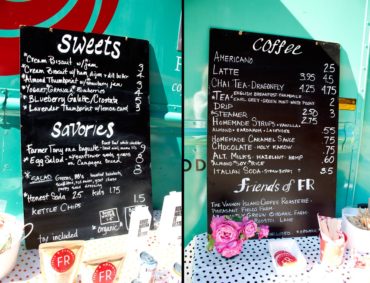 After that, the truck sat on the farm for a few months until Mora could get it to Affordable RV in Bremerton for help with the propane supply and the generator, which was not mounted or encased properly.
After that, the truck sat on the farm for a few months until Mora could get it to Affordable RV in Bremerton for help with the propane supply and the generator, which was not mounted or encased properly.
Once that was done, Mora obtained the required permits for a commercial kitchen and readied herself to open the Farmer Rosie Food Truck at the Port Orchard Farmers Market in June 2016.
The minute Tony started up the truck at the market, there was an obvious problem. The noise from the generator exceeded the market’s sound decibel limits, and the couple was told they couldn’t stay.
“And that just crushed me,” Mora says. “At the same time, knowing it was loud — it wasn’t like we could argue with them. And that’s when our daughter, Alessandra, looks at me — and I’m just crying, I’m just brokenhearted — and says, ‘Mom, just go plug in at the farm. You are a mobile café. You are licensed to be anywhere.'”
A quick post to Facebook alerted friends and fans what had happened and that the truck was on its way to the farm, where Mora could plug it in and bypass the generator.
“And before we even got home, people were here, waiting for coffee,” Mora says. “And it has just been that fabulous since then. It has been that same support, every single weekend, as it was that first day in June.”
Mora knows she is fortunate — there were others who lost thousands of dollars and never saw the food trucks they paid for. “Thankfully, I have a truck, and I have a kitchen, although the stove is installed wrong and nobody knows how to fix it. But I have that… I can still operate here,” she says.
Last year, she kept the food truck open through October. At the end of the summer, when the weather grew colder and wetter, she set up tables in a shed on the property dubbed “The Crowbar.” A customer provided a propane fire pit for “truck credit” and she had a way to keep people warm as well.
“And people love it,” she says. This season, she was able to open the first weekend in March.
Since then, her weeks have developed a routine. Mondays through Wednesdays, she works in the garden — taking care of the food she’ll sell or use in recipes. Recently, that included the addition of 140 raspberry plants to the mix.
This is followed by two days of shopping and food prep, which most likely involves visiting the Bremerton Farmers Market to see what’s in season. She tries to source as many ingredients locally and regionally as she can, including using coffee from Vashon Island Coffee Roasterie and chai from Dragonfly Chai in Portland. When available, she loves to use bread from Saboteur Bakery in Bremerton. Most of her ingredients are organic.
The food truck is still mobile and available for events, within limits — she recently worked at a backyard estate sale because there was an RV outlet on site and she didn’t need the generator. A friend of hers has spearheaded a GoFundMe campaign to help her fix the generator problem once and for all so she can be fully mobile. But she loves her time on the farm.
“It is pretty special,” Mora says. “Every weekend, I get up at 5 o’clock, and get down here at 6 o’clock and start baking, and I think, ‘I just love this.’ And I finish every weekend thinking, ‘This was the best weekend I’ve ever had.’ And it just keeps happening over and over again.”
 Blueberry Galette
Blueberry Galette
Serves 8 • Recipe courtesy Cynthia Mora
The Italians call this pastry crust Crostata — pasta frolla. It tastes a bit like a sweet cookie dough rather than a pie crust. More chooses the richness of this crust but loves to prepare it in the rustic tart, galette, form.
Pastery Ingredients:
- 1-1/2 sticks butter, room temperature
- 1/3 cup + 1 tbsp sugar
- 2 large eggs
- 1 tsp pure vanilla extract
- 2-1/4 cups flour
- 1/2 tsp salt
- Zest from one lemon, reserve half for filling
- 1 tbsp water
Filling Ingredients:
- 2 cups blueberries (heaping)
- 2 tbsp cornstarch
- 1 tsp vanilla extract
- Pinch of salt
- 1/2 of the zested lemon
- Juice from 1/2 lemon
Instructions:
Begin with the pastry. In the bowl of a standing mixer, with the paddle attachment, beat the butter and 1/3 cup sugar at medium speed until pale and fluffy, 2-3 minutes. Beat egg into mixture. Beat in vanilla. Reduce to low speed and mix in flour, salt and 1/2 of the lemon zest, until dough pulls away from bowl. Cut dough in half and form into disks. Wrap in plastic and refrigerate at least 30 minutes. While dough is chilling, stir together blueberries, sugar, cornstarch, remaining 1/2 of zested lemon, juice from half the lemon, vanilla and salt and set aside.
Assembly:
Preheat oven to 425 degrees. Place dough onto a baking sheet lined with parchment paper and lightly floured. Sprinkle a small amount of flour on top of dough. Roll out to a 12-inch round. Stir blueberry mixture and add 1 heaping cup into the center of the dough. Gently fold the dough onto itself, about 1 inch, creating a small rim of crust. Beat 1 egg and 1 tablespoon of water to create an egg wash. Brush onto folded crust and sprinkle with 1/2 tablespoon of sugar. Repeat with remaining disk.
Bake for 15-20 minutes until the filling is bubbling and the crust is golden brown. Allow crostata to cool 5-10 minutes. Cut into desired portions and wow them! Delicious when topped with vanilla ice cream or whipped cream.




























